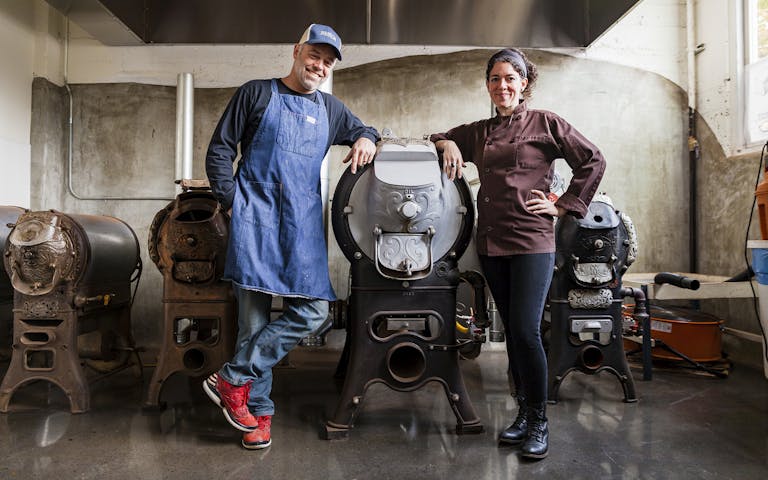About two years ago, I got an inquiry to photograph a medicated dinner for a new cannabis lifestyle magazine. Having just landed in Los Angeles to pursue a career in editorial photography, I said yes. During the course of documenting the dinner, I watched two chefs make sous vide eggs and hand-rolled gnocchi infused with cannabis. The level of culinary craft was on par with the busy, lauded kitchens I often photograph. I could feel in my gut that I was witnessing something big.
In the two years since my first cannabis assignment, Oregon has come into its own as an adult-use market, and canna-businesses are booming, particularly in the culinary cannabis scene. The local edible scene includes a little bit of pretty much everything: ice cream, cold brew coffee, local honey, culinary bitters, loose leaf teas, gourmet salts—even cannabis-infused water. These aren’t your older brother’s weed brownies: Edibles have truly gone gourmet, with makers producing products that attract gourmands and foodies as well as the sophisticated stoner.
Portland’s edible makers are, first and foremost, culinary wizards helping to pave the way for cannabis to be used as an ingredient.
Today, Portland is the epicenter of culinary cannabis in the US, so I flew from LA to Portland to check out a few companies that prove it. Leif Goods, for one, debuted a cannabis flake salt at this year’s Bon Appetit Feast culinary festival in partnership with Bitterman Salt Co., and one of their specialty chocolate bars, a spicy harissa concoction, was created in partnership with James Beard Award-winning Chef Jenn Louis. At Upward Cannabis Kitchen, a former dishwasher (of Portland’s popular ramen shop Noraneko) now creates infused kombuchas and exceptional loose leaf tea blends using tea from Portland’s The Jasmine Pearl Tea Company. And perennial Portland favorite chocolatier Woodblock Chocolate dove into culinary cannabis with bespoke infused chocolate for boutique PDX dispensary Serra, creating a clean, four-ingredient bar with cocoa sourced from the world’s oldest cocoa research center in the West Indies.
Portland’s edible makers are, first and foremost, culinary wizards helping to pave the way for cannabis to be used as an ingredient to elevate foods, both in flavor and overall experience. Meet a few of the makers leading the charge in Portland’s culinary cannabis scene.
● ● ●
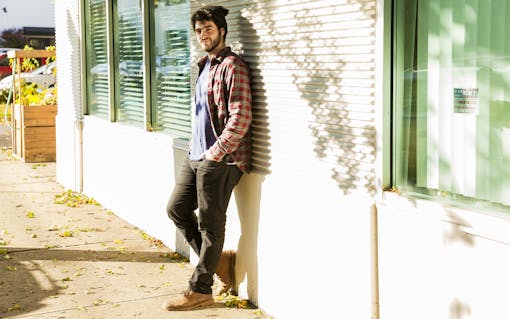
Carlton Bone, Upward Cannabis Kitchen
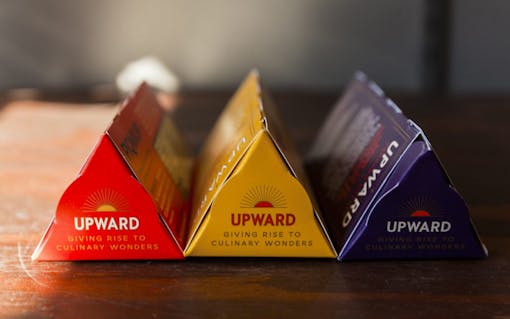
Sleek packaging for Upward Cannabis Kitchen’s loose leaf infused teas. The teas are available at Serra dispensaries in Portland, OR along with Upward’s infused kombuchas. (Oriana Koren for Leafly)
Carlton Bone brings an extraordinary understanding of plant-based medicines and holistic healing to Upward Cannabis Kitchen. We meet at the Jasmine Pearl Tea Company, where green and white teas were sourced for Upward’s indica and hybrid tea blends. “If I’m gonna sell a tea-type product, you’re gonna have the best tea out there,” they tell me.
Synergies in the chemical reactions of tea and cannabis demonstrate just how powerful culinary cannabis can be.
The sourcing of loose leaf teas from a city that really loves its tea was intentional, and derived from Upward’s commitment to using local goods created by expert Oregon makers. Carlton wanted to create specific tea blends that could only be obtained at specific dispensaries across Oregon, sort of like the specialty house wine or beer is often found in a restaurant.
“Our hope was to create a blend of tea that a specific dispensary would want to carry and that tea would be the terpenal equivalent of the dispensary’s custom strain,” they explain. “Using Jasmine Pearl’s knowledge of tea synergy and my knowledge of [cannabis] aromatics and terpenes, we came up with a blend of green and white teas which have catechins in them and affect the [CB2 receptor]—the same neuroreceptor that cannabis affects, so you get this chemical synergy, too.”
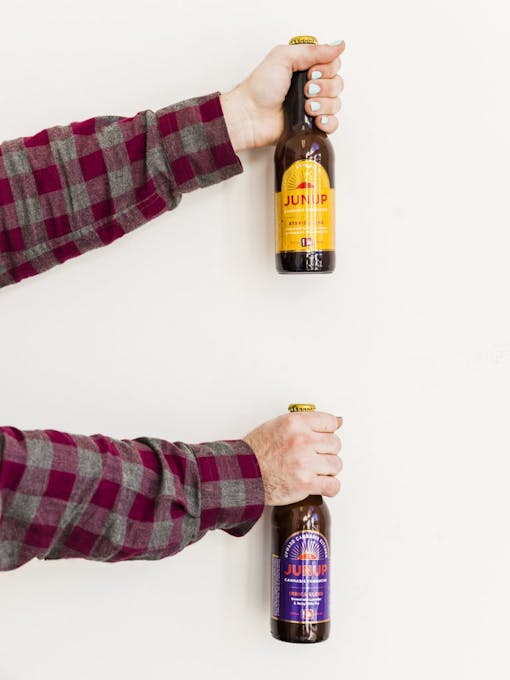
Junup kombucha by Upward Cannabis Company in Portland, OR. The infused cannabis kombuchas can be purchased at Serra dispensaries in Portland, OR. (Oriana Koren for Leafly)
Upward Cannabis Kitchen’s kombucha is fermented from a honey substrate base sourced from a local honey farm in Willamette Valley. (Upward also makes infused honey sticks using the same Best Friends Honey.) The honey is raw processed and thus maintains biomaterial that Carlton tells me is a joy to work with in a ferment, since it’s nearly as aromatic and flavorful as the teas themselves. Carlton also tells me that honey and cannabis are very similar. “Honey is a miracle food,” he says. “It has antimicrobial, antibacterial properties, and chemically, [these are] the same properties we find in THC.”
Carlton talks about the molecular arrangements in tea and cannabis and the synergies in chemical reactions of the two in order to demonstrate just how powerful culinary cannabis can be. Our conversation oscillates between gastronomy and the science of creating a thoughtful, manageable edibles experience for all customers—especially customers like their mother, who was “vehemently anti-cannabis” in the past. (Now, she and Carlton are collaborating on a side project making cannabis suppositories: “Our goal is to create a kit which will have some Upward teas, Revolution Green topicals, the suppository, and medicated bath salts for anyone who needs some relief due to chronic pain or some extra comfort during their cycle,” Carlton explains.)
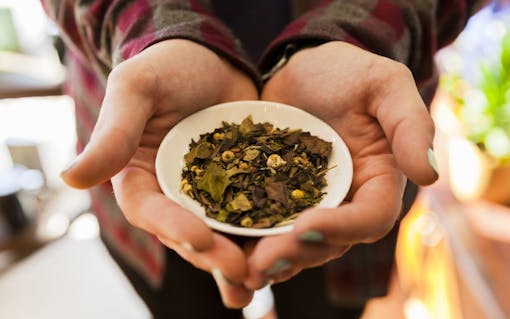
Upward co-owner Carlton Bone holds the specialized white tea blend from The Jasmine Pearl Company in Portland, OR. Upward Cannabis Kitchen creates infused loose leaf teas and kombuchas. (Oriana Koren for Leafly)
Upward Cannabis Kitchen is both revolutionary and community-based, providing a way to share a hot or cool healing beverage with a friend or spend some restorative time alone, nourishing oneself. “I think cannabis, in low doses especially, can be part of a healthy routine for some people. Part of developing these products is showing how cannabis is an extension of tea,” Carlton says.
Headquarters: Southeast Lents
Years working with cannabis: 3
Signature product: Junup Cannabis Kombucha
Favorite strain: Anything with high amounts of CBN, like Animal Cookies
● ● ●
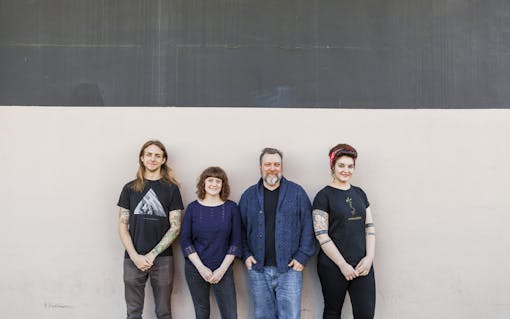
Carrie and Jody Solomon, Leif Goods
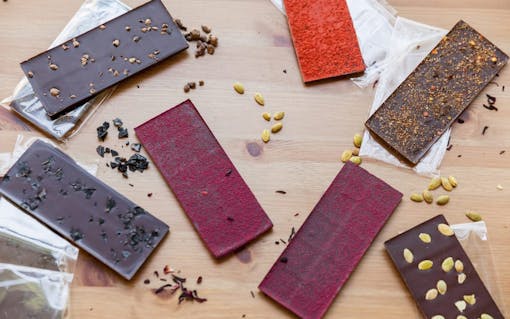
The full lineup of Leif Goods infused chocolate bars: CBD Chocolate Bar with Black Diamond Flake Sea Salt, Mint Hibiscus, Classic Double Chocolate bar, Peanut Butter & Jelly dusted with dried strawberry powder, Limited Edition Sesame Harissa bar dusted with harissa seasoning and the New Mexican chocolate bar with roasted pepitas. (Oriana Koren for Leafly)
Leif Goods has been carving a space for themselves in the culinary cannabis industry since 2014, when the brand began operating in the medical cannabis realm before adult-use cannabis was a reality in Oregon. Leif is owned and operated by husband-and-wife team Jody and Carrie Solomon, who were on the cusp of the booming edible scene back when they first began learning how to make truffles. “We taught ourselves how to make chocolate,” Jody recalls. “We could see legalization getting ready to happen, so we taught ourselves how to make chocolate bars and then it kind of just took off.”
Both artists, Carrie used her graphic design expertise while Jody brought his photography skills to their business. Accustomed to teaching themselves new skills, they leaped together into the edible market, and with that leap they brought along respected friends in the Portland culinary scene to augment the quality and flavors of their chocolates.
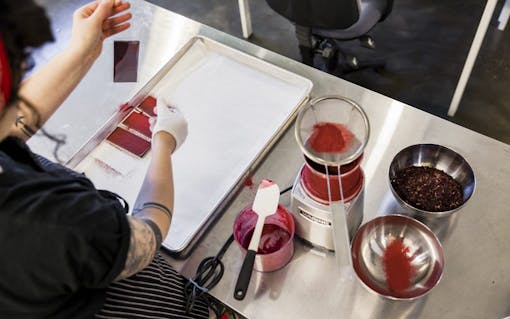
One of Leif’s most popular medicated bars is topped with ground hibiscus flower sourced from local teasan, The Jasmine Pearl Tea Company. Leif Goods is focused on creating high-end, food-focused edible chocolate goods while highlighting the culinary talent found in the Portland food scene via collaborations with local coffee roasters, chefs, and others. (Oriana Koren for Leafly)
Leif has positioned itself as a foodie-friendly edibles company, attracting fence straddlers who have long been curious about edible cannabis.
“We want to celebrate the awesome food in this town,” Jody tells me. Their first chocolate bar, which contained coffee beans, biscotti bits, and cannabis, was widely popular in the medical market before cannabis became fully legal in Oregon. The Solomons are both huge fans of chocolate personally, and their research includes eating a lot of high-quality chocolate to decipher flavor profiles they like—not a bad gig. From there, ideation sessions often lead into a discussion of which of their favorite culinary makers could be good to incorporate into their bars as additional flavors to complement the cacao beans used.
For the espresso-biscotti bar, “We tried different local coffees in the bar so we found the one that really worked well—Ristretto Roasters. They roast their beans until they caramelize so once pulverized that sweetness comes out instead of tasting like a bitter coffee,” says Jody. “There’s a local bakery here called Roman Candle and they make the most amazing biscotti so we’re like, ‘Why don’t we use the best biscotti we can get? And the best coffee we can get? And put it in our bar?’”
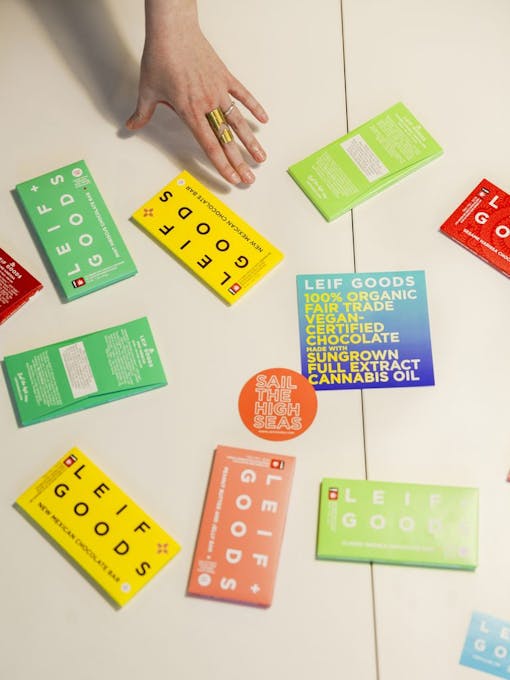
Layflat of all the Leif Goods edible bars. Co-owner Carrie Solomon is principal designer at Leif Goods and uses clean but bright branding to elevate the idea of what a cannabis edible can look and taste like. (Oriana Koren for Leafly)
This focus on being food-first (instead of milligram-first) accounts for a big portion of Leif’s success. With a dedication to conscientious sourcing and whole ingredients, Leif has positioned itself as a foodie-friendly edibles company, attracting fence straddlers who have long been curious about edible cannabis but for a time weren’t compelled by the products on the market.
The recent influx of visitors to Oregon, thanks both to legal cannabis and high-profile events like the total solar eclipse, have brought international interest to Portland’s cannabis scene and the makers within it. The popularity of Leif’s bars can also be attributed to their balanced THC to CBD ratio: When the cannabinoid levels are precise and consistent, edibles become much more manageable, with CBD keeping the effects of THC in check to ensure a balanced and thoroughly modern edibles experience. This ensures that newcomers and old hats alike enjoy their Leif experience every time.

Infused chocolate bars at Leif Goods’ kitchen in Northeast Portland. (Oriana Koren for Leafly)
Headquarters: Overlook in North Portland
Years working with cannabis: 4
Signature product: Mint Hibiscus Chocolate Bar
Favorite strain: Anything super-high in CBD: Harlequin, ACDC, etc.
● ● ●
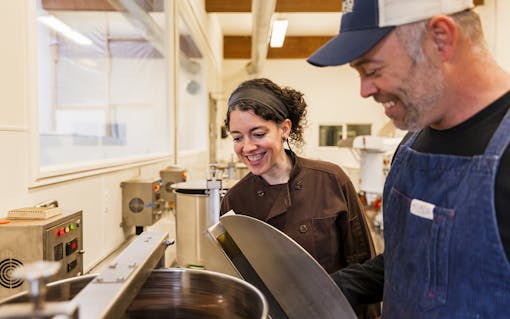
Holly Hukill, Serra / Charley Wheelock, Woodblock Chocolate
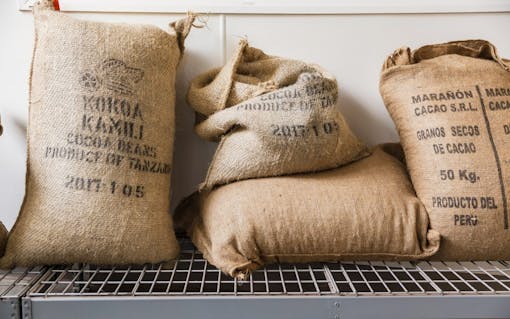
Still life of raw cacao beans waiting to be roasted inside the Woodblock Chocolate manufactory in Portland, OR. (Oriana Koren for Leafly)
Who is eating weed chocolate now? All kinds of people!
Charley Wheelock and Holly Hukill also wanted to have a hand in helping to shape a burgeoning cannabis culture that caters to more than just ‘stoners,’ and that desire led to a unique Portland product partnership. Together, the two are behind the popular chocolate bar created by adored Portland bean-to-bar chocolatier Woodblock Chocolate for ultra-curated Portland cannabis dispensary Serra.
“Who is eating weed chocolate now? All kinds of people!” Charley muses aloud when I meet him. Individually, Holly is the product development director for Serra, while Charley and his wife Jessica co-founded Woodblock. In this partnership, Charley is responsible for the chocolate side of things; Holly then takes Woodblock’s chocolate and infuses it at Serra’s lab. Inside the lab, the dispensary’s flower is grown, turned into oil, and then added to the chocolate bars.
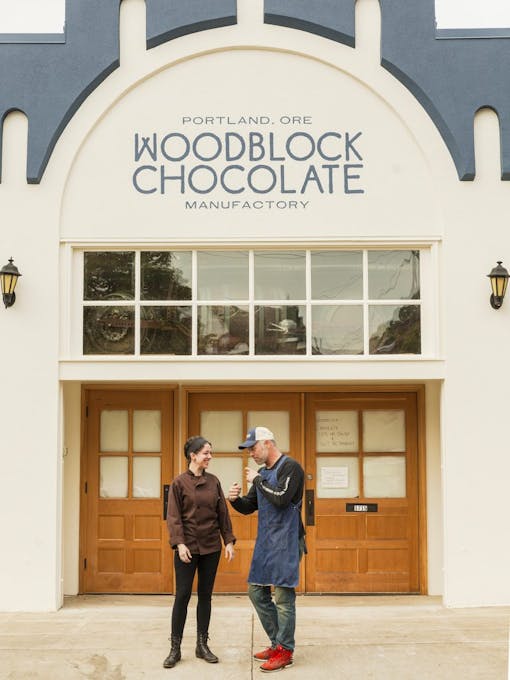
Chocolatiers Holly Hukill and Charley Wheelock chat in front of the Woodblock Chocolate manufactory in Portland, OR. Hukill infuses Woodblock’s chocolate as a part of a special edible collaboration for local dispensary Serra. (Oriana Koren for Leafly)
Seeing the potential to move into the new, undefined market space of Oregon cannabis, an entry into culinary cannabis captured the imaginations at Woodblock and led to the creation of a low-dose chocolate bar with high-quality cocoa sourced from places like Central America, Africa, and the West Indies. While in the roasting room with Holly, Charley breaks down why the Woodblock-Serra partnership has been so successful and, for him, it’s all about unadulterated, conscientiously sourced ingredients. “What we are doing is so pure,” he explains. “We use cacao, sugar, cannabis oil, and a little cocoa butter. We’re doing a four-ingredient infused bar, that’s rad!”
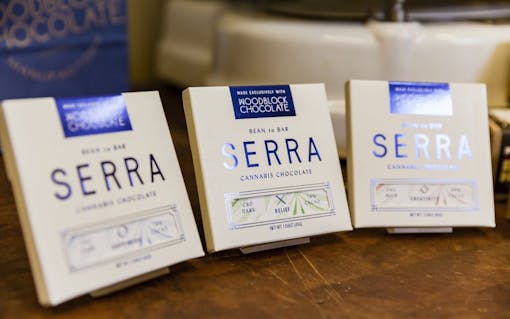
Sleek packaging for the Serra x Woodblock Chocolate infused bar collaboration. The bars are low-dose and comes in three types: Happiness, Relief, and Creativity. (Oriana Koren for Leafly)
Woodblock already has its sights set on expansion beyond Oregon, and Holly and Charley are hard at work discovering how to use cannabis flower aromatics as flavor profiles for upcoming culinary projects. “We can’t tell you a lot,” Charley says, “but it is fun talking about the terpene infusions.” It’s clear he’s as excited as anyone about the future of Oregon cannabis, adding, “We have a bunch of fun things coming up.” If the three culinary cannabis projects I profiled are any sign of what’s to come, we are really on the brink of an incredible moment of culinary innovation lead by cannabis—and I can’t wait to see what’s next.
Headquarters: Northeast Portland
Years working with cannabis: 5
Signature product: Woodblock x Serra THC Peruvian Milk Chocolate Bar
Favorite cannabis strains: Tangie (Charley); Astral Works by Prūf Cultivar (Holly)
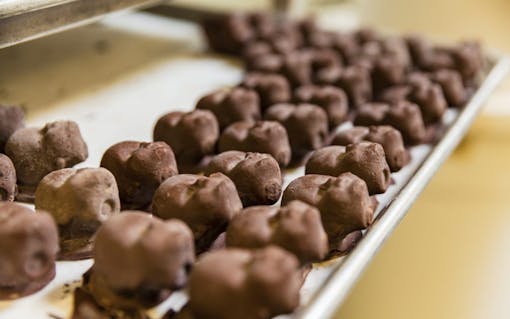
Baby Head chocolates at the Woodblock Chocolate manufactory. The Woodblock team recently launched an infused chocolate bar with Serra dispensary as a move into the currently booming culinary cannabis market in Portland, OR. (Oriana Koren for Leafly)
● ● ●
Flood images: Oriana Koren for Leafly
